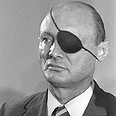
Dayan to Golda: If we can't evacuate, we'll leave wounded behind
On 37th anniversary of Yom Kippur War, Ynet releases minutes of top secret cabinet meeting held after first day of fighting. Heated debate depicts Israel's dire situation. Defense minister says Arabs looking to 'conquer Israel, finish Jews off'; Golda Meir: They smelled blood. IDF chief presents military options
October 7, 1973. 2:50 pm. A little more than a day after the outbreak of the Yom Kippur War, then-prime minister Golda Meir and her cabinet hold a dramatic meeting. Then-defense minister Moshe Dayan discusses the fall of IDF positions, one after the other, in the Sinai Peninsula. "The canal line is lost," he says, and suggests a withdrawal to the Isthmus line, some 30 kilometers (about 19 miles) from the canal, while leaving behind the injured soldiers who cannot be evacuated. "Where we can evacuate – we will evacuate. In places we can't evacuate – we will leave the wounded. Those who make it – make it. If they decide to surrender, they'll surrender. We have to tell them, 'We can't reach you. Try to bust through or surrender.'"
The meeting's minutes, which were classified as "top secret," are being published for the first time by Ynet after being obtained from the State Archives to mark the war's 37th anniversary.
Dayan predicted that the international community would mock Israel and refer to it as a "paper tiger" after the country failed to sustain its initial attack despite having a military edge. Meir responded by saying, "I don’t understand one thing – I thought we would begin hitting them as soon as they cross the canal. What happened?"
Dayan said, "We lost tanks. There was artillery, our tanks were hit. The planes weren't able to approach because of the missiles. A thousand artillery barrels allowed the tanks to cross and prevented us from getting close. The planning and methodology was Russian. Three years of preparation."
Dayan spoke of hundreds of fatalities and numerous prisoners of war, and admitted he was wrong in his assessment of the enemy's objectives. "This is not the time for soul-searching. I underestimated the enemy's strength and miscalculated our forces' ability. The Arab fighters are much improved; they have many weapons. They hit our tanks with their personal rifles. The missiles serve as an umbrella, which our planes have a hard time bursting. I don’t know if a preemptive strike would have changed the picture significantly," he said.
Dayan (right) on bank of Suez Canal during war (Archive photo: Yehuda Tzion, GPO)
"They (Arabs) want to go for the entire Land of Israel," Dayan said. Golda responded, "This is the second round since 1948." "It is a battle for the Land of Israel," Dayan declared, "The Arabs won’t stop the war, and if they agree to a ceasefire – they may resume (the fighting). If we withdraw from the Golan Heights, it won’t solve anything."
Golda added: "They have no reason not to continue. They smelled blood." Dayan said, "To conquer Israel, finish off the Jews."
Dayan continued with his pessimistic tone. "I'm certain that Jordan will join the fighting. We can't afford not to be prepared. A minimal level of preparation is required. We must prepare a force against a Jordanian attempt to invade the West Bank. They might allow terrorists to operate as well."
Golda suggested putting then-US Secretary of State Henry Kissinger into action, and Dayan said Israel should purchase 300 tanks form the Americans, adding, "We'll need more planes." Golda spoke of a tense meeting with IDF chief of staff at the time, David "Dado" Elazar. "Dado was sad," she said, "He said he hopes tonight will be a turning point."
Dayan concluded his briefing with a harsh statement, possibly alluding to the need to use other means to curb the threat. "The amount of weapons they have is effective. Our moral advantage is not enough in the face of such (an amount). The numbers are very crucial. Perhaps there are other ideas as to how we should operate in this situation. "
About an hour after the cabinet meeting began, IDF chief Dado entered the room. "We are facing a fateful decision. There is no room for mistakes here." He said the army had three options:
1. Deploy two divisions along a temporary line of defense, from which the army will launch counter-attacks. "I am not certain we will be able to hold the line and then attack."
2. Solidify IDF positions along the Isthmus line. "This line is exacting a heavy price."
3. "This option is risky. I consulted with members of the General Staff. They suggested we attack the canal and move forward." According to the plan, Avraham Eden (Bren) and Arik Sharon's divisions would cross the Suez Canal and destroy enemy forces. "It's a gamble, because these are the only two divisions between the canal and Tel Aviv. If we the attack on the canal is unsuccessful, we are left with three broken divisions, then the Iraqis and Algerians come and in two-three days the war is inside the Land of Israel."
Dado suggested a counter-attack, "Not on the canal, but on the concentration of (enemy) forces that have already crossed. Perhaps before morning comes, with 200-300 tanks and from the air, we can try to break the force that has crossed and then deploy along the line again. If it works, we're at a good starting point; if not, it's not fatal. We'll have enough strength to withdraw to the passages."
Minister Yigal Alon spoke of bombing deep in enemy territory, but Dayan estimated that bombing Damascus would not affect fighting at the front line. "We may hit oil, electricity, but nothing more. Every attack means more casualties," he said.
- Follow Ynetnews on Facebook











